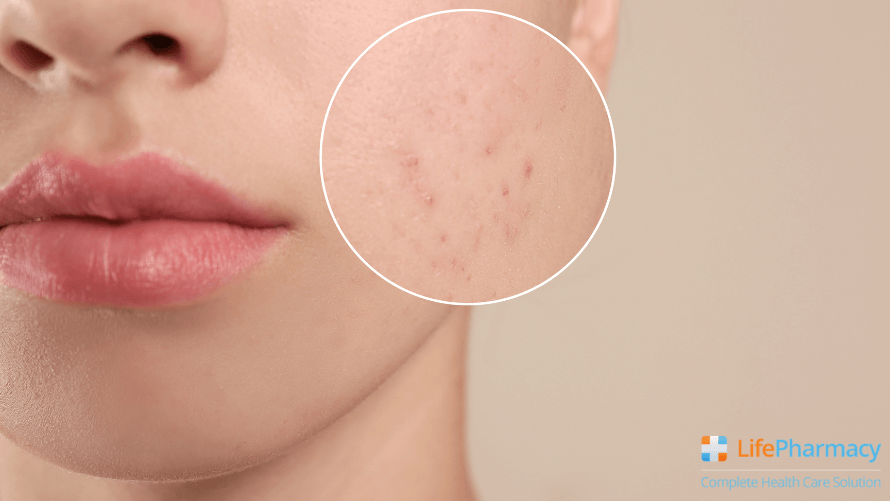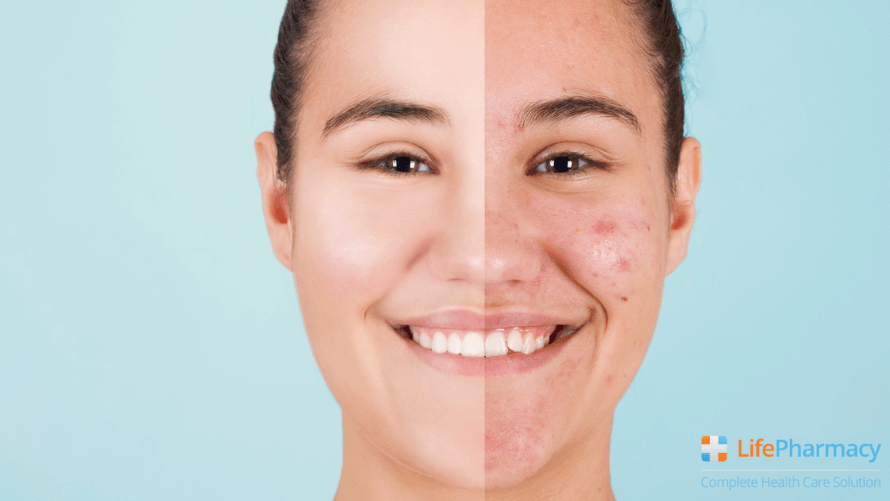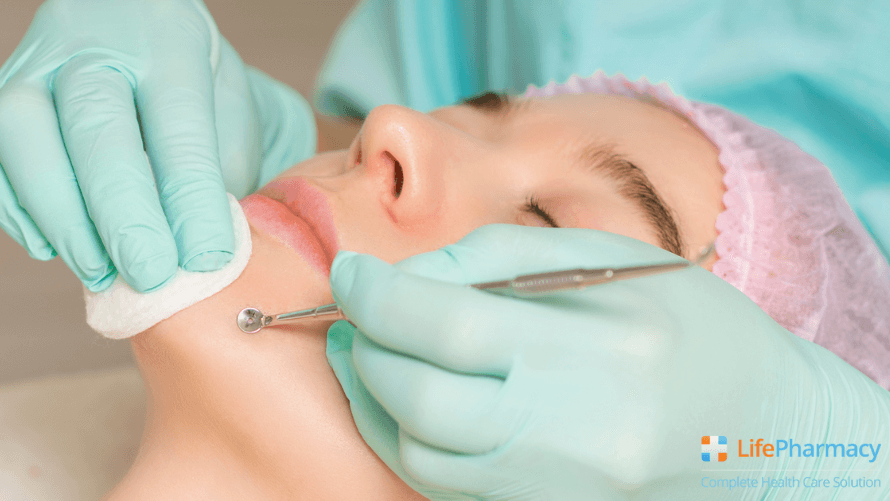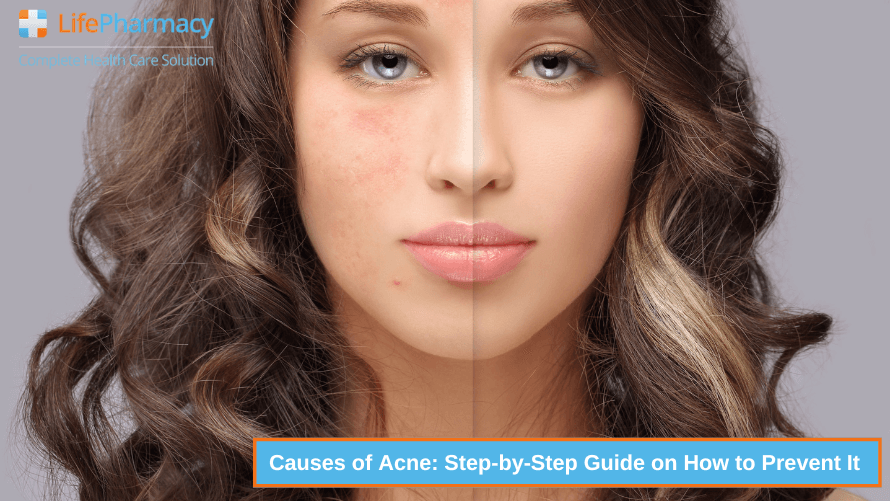Acne can be persistent, with one pimple healing at a slow pace while another begins to pop its head. However, there are a number of effective acne treatments available to reduce the number of pimples and minimize the chances of scarring, thus saving you from emotional distress. The earlier you start the treatment, the lower your risk will be!
Read this article from a UK pharmacy to know everything about acne:
What causes Acne?

Acne occurs when the pores of your skin or hair follicles become clogged with oil, dead skin, or bacteria. Small tube-like structures that hold a hair strand are called hair follicles. Each skin pore opens to a follicle. Each hair follicle contains hair and a sebaceous oil gland. The pores get clogged when too much sebum, bacteria, or dead skin cells is deposited inside your hair follicle, creating a pimple.
Sebum produces oil which prevents the skin from drying out. But when produced in excess, it mixes with the dirt and bacteria, creating blocked pores. Pimples trigger inflammation, causing pain, swelling, and redness. But what we need to clearly understand is what causes acne to happen? What are the triggering factors that can cause acne breakouts?
Here are a few reasons that can contribute to acne:
-
Hormonal fluctuations, especially testosterone, that naturally occur during puberty can trigger acne. This is the main reason teenagers experience more breakouts. Hormonal imbalance can result in the overproduction of oil, increasing the risk of acne development. Usually, acne that is related to puberty reduces or may even stop completely once you reach adulthood.
-
Besides this, women tend to experience hormonal changes during menstruation or pregnancy. This can be the leading cause of acne in women. Polycystic ovarian syndrome (PCOS) and other endocrine conditions also make women more prone to acne than men. You can try a range of feminine health products from an online pharmacy to help you during these crucial times.
-
Acne can also be caused if you have a family history for the same. Genetics plays an important role in acne development. So if your parents had acne, you are more prone to have it too.
-
Certain medications, like some antidepressants, medicine containing lithium, hormonal birth control pills, steroids, and epilepsy medications, can cause acne to develop.
Besides the above-mentioned factors, there are certain lifestyle and environmental factors that can add to the risk of developing acne
-
People who constantly wear headgears like hats, caps, helmets, backpacks, etc., may tend to see acne outbursts in those areas due to more sweating and oil deposition. Wearing tight-fitting clothes can also trigger acne.
-
Air pollution increases dirt deposition on the skin aggravating acne. When the humidity is exceptionally high in certain areas, it may make acne worse.
-
Using cleansers, creams, moisturizers, or any other beauty products that are high in oil content can also add to acne development risk. Working in environments where you can come in contact with too much oil or grease, such as a restaurant's kitchen or garage, can pose a problem.
-
Stress is considered to be a killer when it comes to most ailments, and acne is no exception. High levels of stress can increase the hormone cortisol, which can be the reason why some people experience acne.
-
Acne can be irritating, and so people tend to pick at it. Unfortunately, that is the worse thing to do, as you will invite more acne in the surrounding areas.
Depending upon the severity of your condition, acne signs may vary from blackheads, whiteheads, pustules, and cysts. Usually, the most common acne spots are on the face, shoulders, chest, and back, but wherever there are hair follicles on the body, acne spots can appear.
What are Few Acne Myths?
These factors for a long time have been considered to cause acne; however, in reality, it is not true. These factors have no effect on causing acne:
-
Chocolate and greasy foods: It has always been a myth that people who are more prone to eating chocolate or fried foods suffer from acne breakouts. But this is not really true. Eating chocolate or greasy food has little to no effect on acne.
-
Hygiene: Hygiene has also always been high on the radar when predicting the cause of acne. But all those who detest bathing or washing regularly can relax as acne isn't caused by dirty skin. Contrastingly, if you scrub your skin too hard, or use harsh soaps or creams that can irritate the skin, then you are at high risk of making your acne worsen.
-
Cosmetics: Having acne problems does not mean you need to dump all your cosmetics in the bin. But yes, you have to be choosy about the products you use on your skin. Oil-free makeup does not clog your pores. So you can safely use it, but removing your makeup is a must before you go to bed.
How Can You Prevent Acne?

It is quite difficult to cure acne completely, but practicing some lifestyle alterations can help to prevent the acne from worsening.
Here are good habits that you can adopt to prevent acne flare-ups:
-
Washing your face regularly, especially after exercise or excessive sweating, can be a great step towards maintaining your skin condition. Cleaning your face and removing any makeup before going to bed should be an important part of your skincare routine. Especially during summer, you need to go that extra mile to take care of your skin to avoid acne. After cleansing, nourish your skin with an oil-free moisturizer.
-
Using gentle, oil-free cleansers, as well as other beauty products, can help to prevent your pores from getting clogged. Products labeled “non comedogenic” are quite helpful when it comes to keeping your pores from clogging. Refrain from using skin care products with astringents, alcohol, exfoliants, and toners, as they tend to irritate your skin.
-
A healthy and balanced diet is imperative for overall health. Although there is no direct relation between diet and acne, a diet rich in fruits, veggies, legumes, fish oils, etc., can reduce inflammation, hydrate your skin, and prevent acne flare-ups. If your diet is not able to meet your nutritional needs, then you can take vitamins and minerals for skin, hair, and nail care.
-
No food as such can cause acne breakouts; however, if you are prone to acne, then it is best to skip highly processed foods, sugary foods, drinks, and dairy products as they may trigger acne. Although there is not much evidence, most of these foods tend to spike blood sugar levels and cause inflammation that can spike acne.
-
Exercise has many health benefits, including benefits for the skin. Regular exercise helps to increase blood flow, which means more blood supply to the skin, thus improving complexion. It also enables the body to circulate oxygen and nutrients to the skin cells and carry waste byproducts away from the cells. Sweating during your exercise session helps the skin to get rid of excess dead cells, bacteria, and dirt which can clog pores and increases your chances of infection.
Additionally, exercise has proved to show benefits for mental health by reducing stress. Thus, it can alleviate stress-related acne as well.
-
Avoid tight-fitting clothes and unnecessary sun exposure, as it can exacerbate acne.
-
Keeping long hair clean and tied so that they do not keep rubbing against your facial skin can help keep acne in control.
-
Picking or squeezing your pimple is an absolute no-no. If you are habituated to keep touching your pimples, it can leave scars on your face and also spread bacteria and excess oil, making your situation worse. Allowing your skin to heal naturally can lead to scar reduction.
How Can You Prevent Acne With Treatment?

Even after following all the precautions, if acne is still troubling you, then it is important to control it using OTC medication. You can speak to an online chemist UK as we have a range of medicines and creams to help deal with your acne problems.
Sometimes topical medication would not be effective; in that case, it is best to seek help from a medication practitioner.
Some healthcare providers might prescribe antibiotics to decrease infection and inflammation caused by bacteria. Bacteria can cause clogged pores; antibiotics control bacterial growth, preventing them from multiplying. Antibiotics cannot cure acne, but it can reduce pain and swelling and prevent the infection from spreading.
Conclusion
Although acne is one of the most commonly occurring skin ailments, it can get tough at times to deal with it. It is a temporary condition that usually gets cured by following certain precautions, but if it tends to get stubborn, you must seek medical attention at the earliest.
By following a proper skin care regimen and using the products recommended by dermatologists from Life Pharmacy UK, one can ease acne breakouts and reduce scarring. Acne can be tough, but plenty of effective treatments can help ease breakouts and heal your skin.






